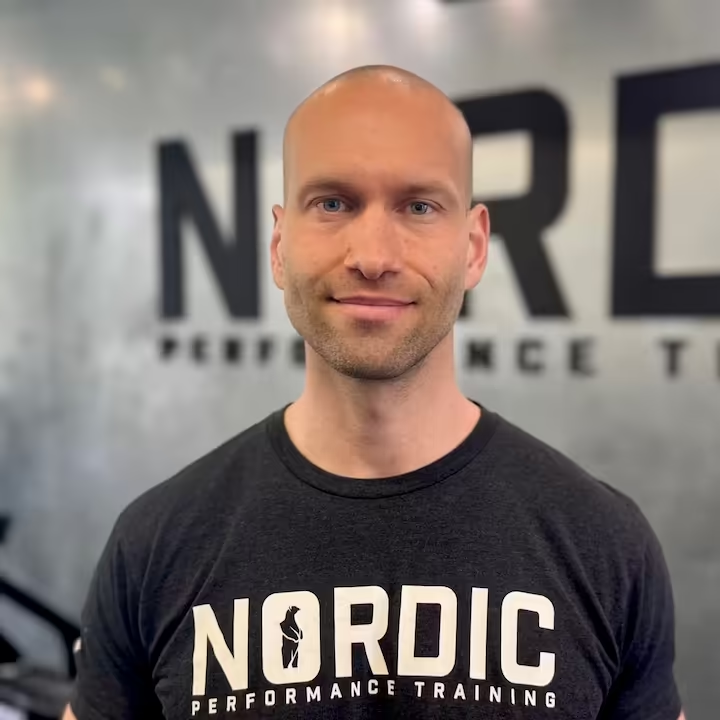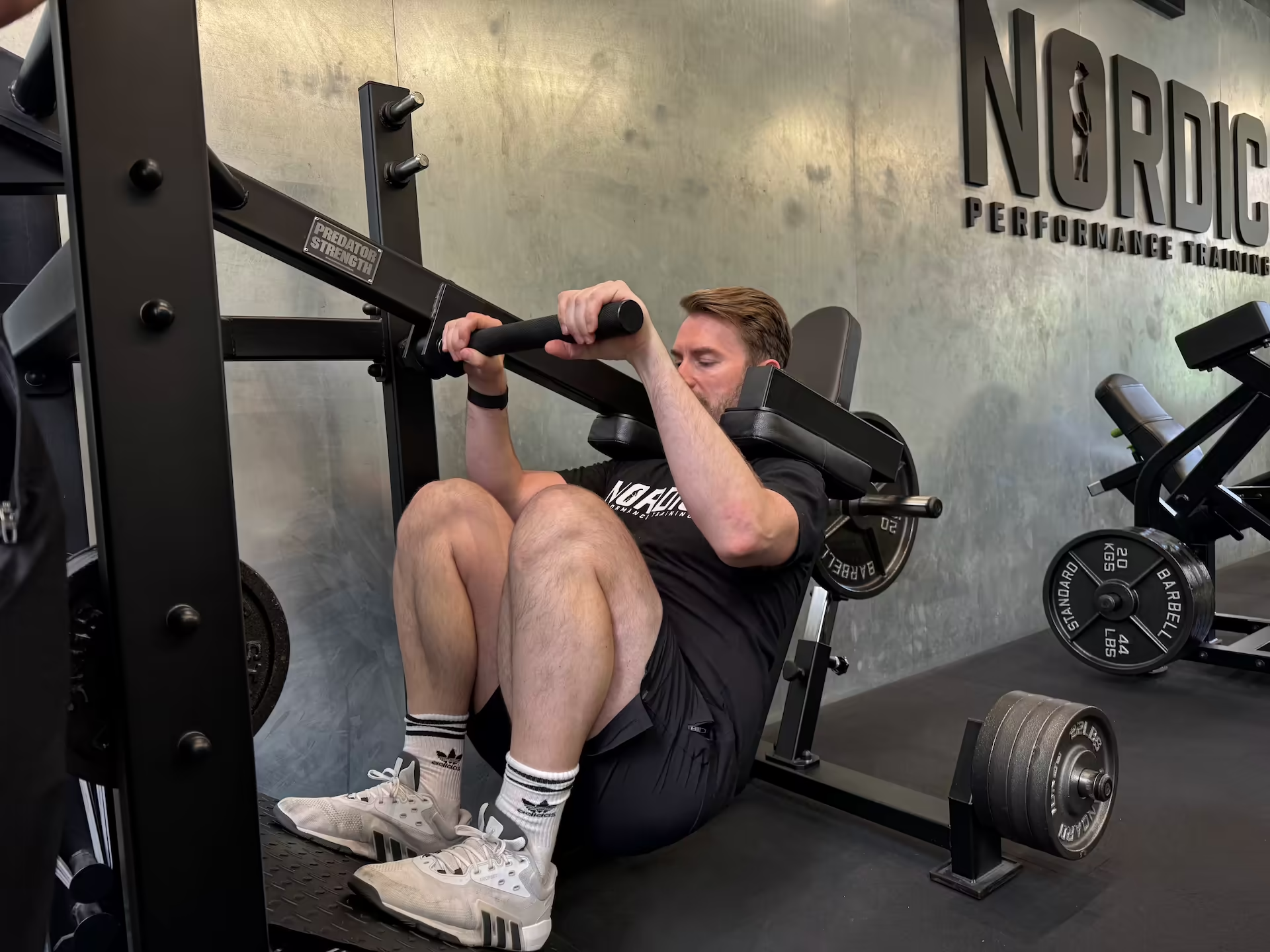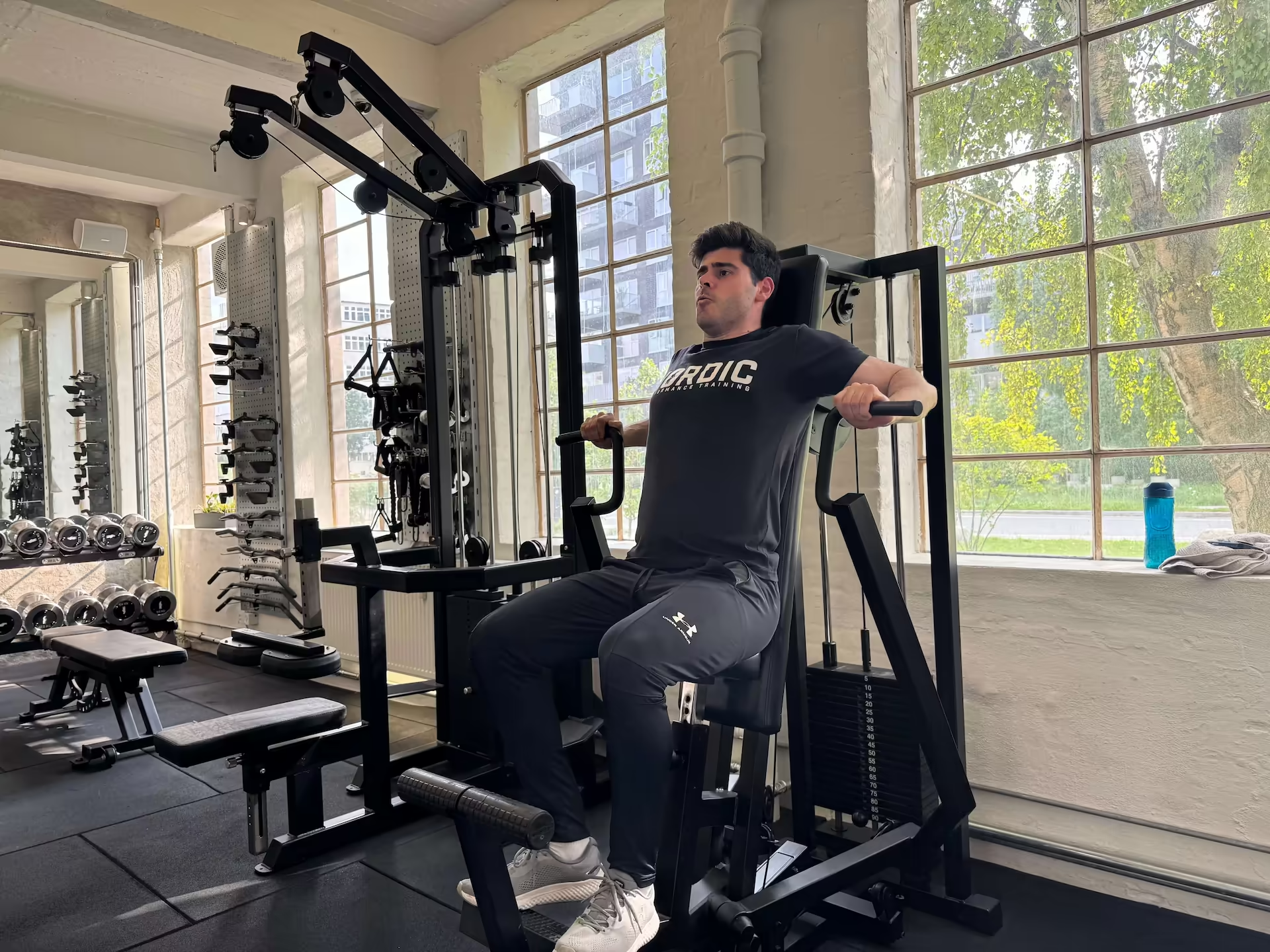What Are Supplements? Expert Advice from 3,000+ Clients
Reading time: Approximately 20 minutes. If you just want to know what to buy, you can skip directly to our recommended supplements.
With over 10 years of experience as trainers and physiotherapists and more than 3,000 clients at Nordic Performance Training, we know exactly what actually works – and what doesn't.
Many believe that the more supplements they take, the healthier they become. But after more than 10 years with thousands of clients, our experience shows something else: More products in the cabinet rarely lead to better health – often the opposite.
Recently, we had a 33-year-old consultant for a start-up conversation who had been convinced he should take almost 10 different supplements daily.
"I spend so much money on it every month," he admitted. "But I just want to be sure I get everything I need."
After more than 3,000 client courses at our personal training gym in Copenhagen, we've seen the same pattern again and again: Either people take no supplements at all, or they fill the cabinet with products they don't need – without structure and without real results.
DTU Food Institute documents that 61% of adult Danes regularly take supplements – with women as the most active users (71% versus men's 51%). But through our experience, we've observed that the majority take products they don't need.
The secret isn't to take more supplements. It's to take the right few – and keep doing it week after week.
Our approach is based on:
- Practical experience from 3,000+ successful client courses
- Systematic review of scientific literature
- Over 10 years of experience with evidence-based sports nutrition
- A conservative approach where we only recommend products with solid documentation
Our philosophy is simple: Focus on the few products with documented effect, avoid the rest, and remember that supplements can never replace basic healthy habits.
Disclaimer: The information in this article is for general information and does not replace professional medical advice. Always consult your doctor before starting with supplements if you take medication or have health problems and never consume more than the recommended doses.
Why many take supplements they don't need at all
One of my clients – a dedicated marathon runner in his 40s – recently came to training with concerns about his recovery. He had read about a new "game-changing" supplement on social media and was considering adding it to his existing eight daily supplements.
When we reviewed his diet, training, and sleep routines, it became clear that the problem didn't lie in lack of supplements. He only slept 5–6 hours per night and was quite irregular with his meals and their content of carbohydrates and protein before and after training. After we got control of these fundamental factors, he now sleeps 7–8 hours every night and eats a carbohydrate and protein-rich pre- and post-training meal – without adding any supplements. On the contrary, he ended up cutting some out, and he experienced significantly better recovery in just three weeks.
Pattern we see again and again
Experience from our 3,000+ clients:
- Approx. 50% use multivitamins as their primary supplement
- Approx. 20% take vitamin D regularly
- Approx. 10% use fish oil/omega-3
- But around 80% could achieve better results by optimizing basic habits rather than adding new products
Why people buy too many supplements
The supplement industry lives on uncertainty. Many feel they "just need to be completely sure" and end up filling the cabinet with products they don't need. Our experience shows the same thing again and again: simple, well-documented regimens give far better results than complex combinations.
The biggest insight after more than 10 years: The industry wants you to believe that health is complicated. But when we analyze systematically, it turns out that most people's needs are quite simple.
What are supplements – and what may they promise?
We often get this question from clients who are unsure about what they're buying. Let me explain the differences as they have practical significance.
Food Administration's definition: Supplements are concentrated sources of nutrients or other substances with nutritional or physiological effect that are marketed in dosage form and are intended to supplement the normal diet.
Supplements vs. medicines
Supplements
- Regulated under food legislation (less strict)
- May only claim physiological effects like "contributes to normal muscle function"
- No requirement for clinical studies before marketing
- Can be sold in supermarkets, online, and pharmacies
Medicines
- Regulated under pharmaceutical legislation (very strict)
- May claim treatment effects
- Require extensive clinical studies
- Only via pharmacy with or without prescription
What does it mean for you?
When you, for example, read that a vitamin D product "contributes to normal immune function" instead of "strengthens the immune system," the difference is about legislation. The first formulation is permitted because it describes a natural physiological function, while the second would be a health claim that only medicines may use. This distinction helps protect consumers from exaggerated claims, but it can simultaneously create confusion.
How do supplements work in the body?
When we take vitamins and minerals, it can be difficult to feel an immediate effect. Many supplements are not something we necessarily experience from day to day, but they can make a difference in the long run – especially if the body lacks something.
How the body uses supplements
Helpers: Many vitamins and minerals function as small "tools" that help the body's processes run smoothly.
Signaling substances: Vitamin D is technically more a hormone than a vitamin. It plays a role in everything from bones to immune system.
Building blocks: Protein powder, calcium, and similar are used directly as building materials for muscles, bones, and tissue.
Protection: Vitamin C and other antioxidants help protect cells from damage.
When during the day should you take supplements?
The right time and meal composition can have great significance for how well your body absorbs supplements. Fat-soluble vitamins require fat for optimal absorption, while minerals like iron, magnesium, and zinc react differently depending on stomach content and time of day. Small adjustments in your routine can therefore make a noticeable difference in the effect of your supplements.
Which supplements should you consider?
Choosing the right supplements can make a big difference for your health and energy. Below you'll find the most effective supplements based on research and our practice. The table provides quick overview of what they do, who needs them, dosage, price, and who should avoid them. Based on our practice and review of research, here are the supplements that consistently deliver results:
Table overview: Vitamin D, Omega-3, Multivitamin, Magnesium, and Iron
Best supplements for strength training and sports
This is Nordic Performance Training's specialty. After 10+ years of experience optimizing our clients' results, we know exactly which supplements deliver measurable results – and are cost-effective.
Research is clear: Of 100+ investigated sports supplements, there are only 5 that consistently show documented effect on performance or muscle growth.
1. Creatine – The most reliable supplement
Creatine is not only the most scientifically tested supplement – it's also what I see works best in practice.
Client case: A client follows our Full Body program 1x per week. He had seen good results through 9 months but had now stagnated. We talked about going up to 2x Full Body per week, but he didn't have the time. Therefore, we recommended creatine daily. Result: Over the next 6 months, all numbers rose steadily again.
How it works:
- Creatine replenishes ATP stores in muscles
- The body's energy currency during explosive work
Documented benefits:
- 10-15% improvement in anaerobic performance
- 5-15% increase in maximum strength
- Accelerated muscle growth combined with training
- Possible cognitive benefits (improved focus and memory)
Practical use:
- Dosage: 5 g daily
- Type: Creatine monohydrate (cheapest and most documented)
- Timing: Doesn't matter – many take it post-workout for practical reasons
- For whom: Everyone who strength trains regularly
- Price: 20-30 kr/month
Creatine works best when combined with structured strength training. Read our in-depth Full Body article, which contains 3 free training programs.
2. Caffeine – Acute performance boost
Practical observations:
Many of our clients come directly from work and can be exhausted upon arrival. Here one can advantageously drink 2-4 espresso shots (200-400 mg caffeine) 45-60 minutes before training.
Caffeine has proven effect on increased mental surplus and reduced perception of discomfort. With all physical activity, a perception of discomfort arises – pulse increases, blood pressure rises, and breathing becomes harder. Caffeine helps dampen this perception.
Optimal use:
- Dosage: 3-6 mg/kg body weight (200-500 mg for a 70 kg person)
- Timing: 30-60 minutes before training
- Strategic use: Not daily (tolerance develops quickly)
- Sources: Coffee, tea, caffeine tablets give identical results
- Price: 0-50 kr/month (depending on source)
3. Protein powder – Practical supplement, not necessity
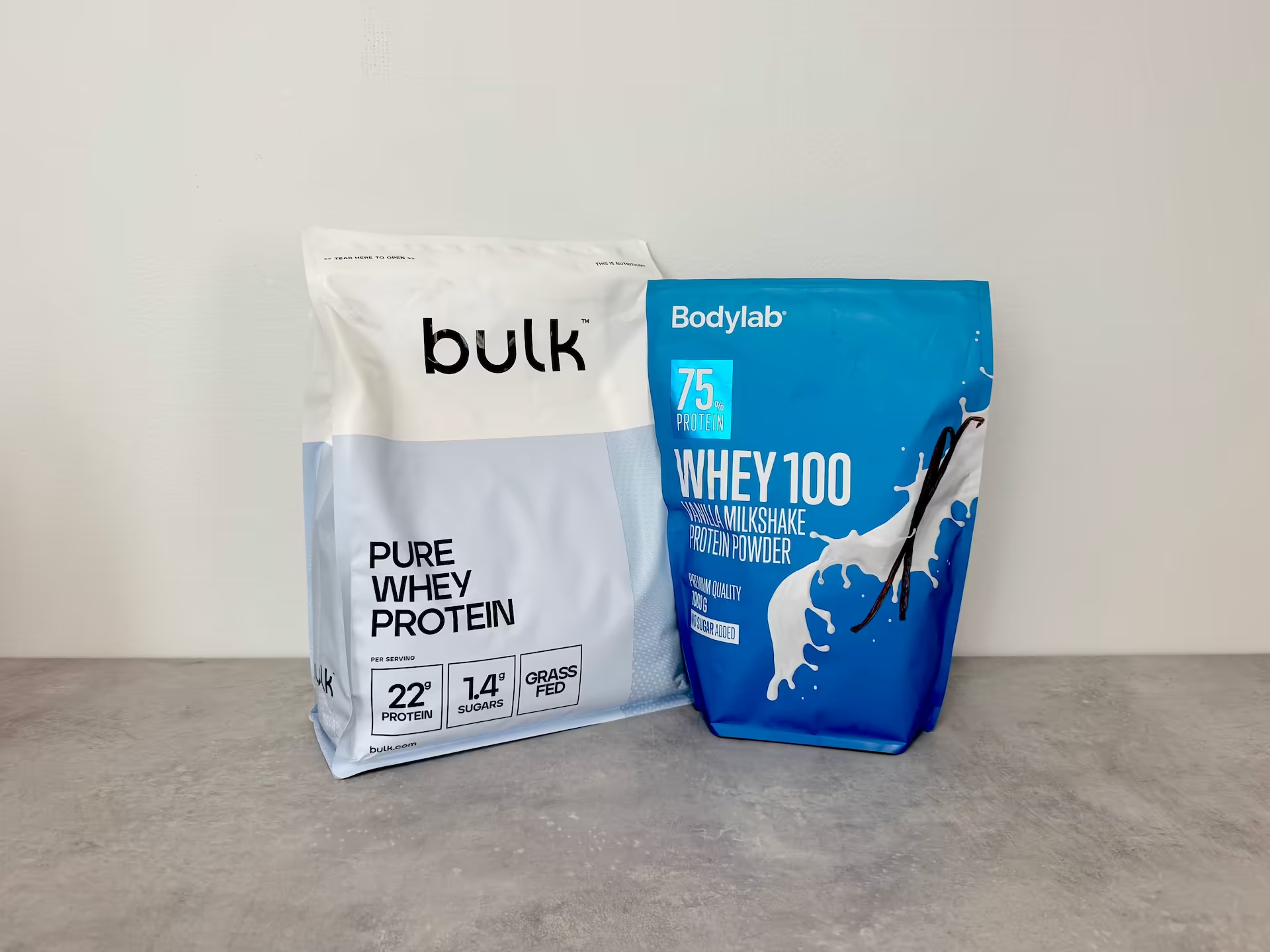
"Should I have protein powder?" asks almost every new client. My answer depends on their diet analysis.
Client case: Recently, during a training session, I talked with one of my clients – a 40-year-old engineer – about his dietary habits. From what he told me, I could estimate that his daily protein intake was approximately 0.8 g/kg (approximately 65 g total). For a person who strength trains regularly, the optimal is 1.6–2.2 g/kg. He was too busy at work to focus more on diet, so here protein powder made sense as a practical solution.
Who should use protein powder:
- Difficult to reach 1.6-2.2 g protein per kg body weight through food
- Practical post-workout nutrition
- Vegetarians/vegans with limited protein sources
Practical tips:
- Dosage: 30-40 g per portion for optimal muscle protein synthesis
- Type: All types – whey, casein, soy give the same long-term results
- Timing: Less important than daily total
Important to remember: Protein powder is just a normal food source in powder form – a convenience solution. If you already consume your necessary protein needs through regular food, protein powder is unnecessary.
Price: 200-400 kr/month (with daily use)
Read our full Protein Powder Guide to find out if you even need it.
4. Beta-alanine – Specialized tool
Beta-alanine increases muscles' content of carnosine, which helps buffer lactic acid during high-intensity work for 1-4 minutes. It's especially relevant for elite athletes but not necessary for regular strength training or fitness.
- Dosage: 4-6 g daily (requires 4 weeks loading)
- Side effect: Harmless tingling sensation
- For whom: Only elite athletes – not necessary for regular strength training
- Price: 50-100 kr/month
5. Carbohydrates for training – When do you need it?
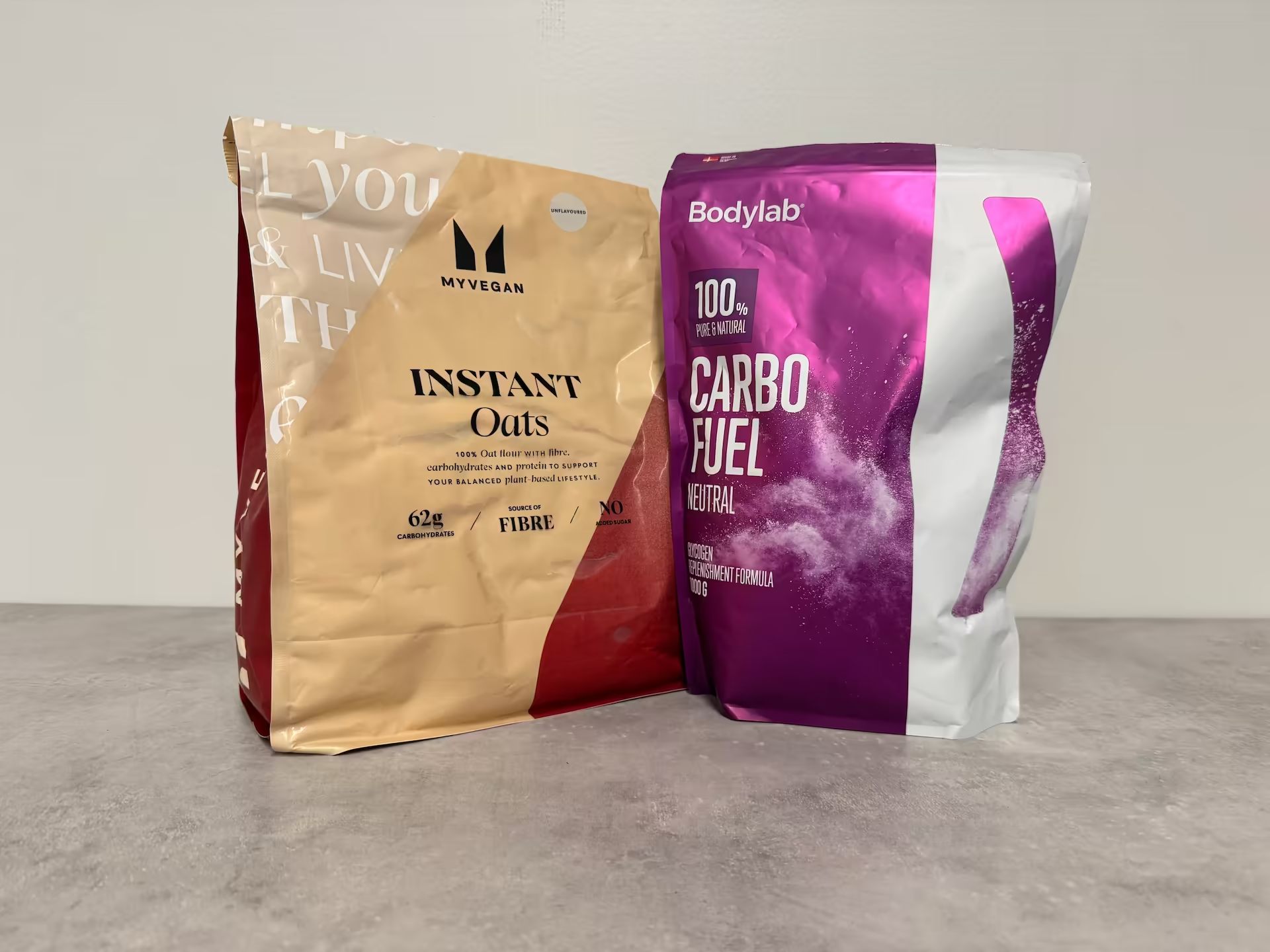
Carbohydrates like dextrose and maltodextrin can function as quick energy sources around training. They are especially relevant when the body needs quick energy:
- Training on empty stomach or in fasted state
- Training sessions lasting over 60-90 minutes
- Double sessions on the same day with short recovery time
- Very intensive training like endurance sports
Practical dosage:
- 30-60 g carbohydrate before or during training
- Rapidly absorbable sources like dextrose and maltodextrin
- Consume 15-30 minutes before training or during longer sessions
Note: This rarely has relevance for our clients, but clients who repeatedly forget to eat 1-2 hours before training can use it as a backup solution.
Read more about optimal nutrition before training in our guide: Best Pre-Workout Meal Before Strength Training.
Price: 30-60 kr/month (with use 2x/week)
How do you choose good supplements?
"How do I know if a product is good?" is a completely normal question from clients. The answer is fortunately quite simple.
How to read the label
When you're holding a supplement in your hand, you should check three things: precise dosage (clearly stated in mg or micrograms per capsule), manufacturer info with contact information within EU, and an expiration date that's at least 6 months ahead. If these three things are in place, you're on the right track.
Avoid these products
Stay away from products with unclear doses or "proprietary blends" – secret mixtures where you don't know what you're getting. Extremely high doses like 50,000% of the recommended daily intake without scientific justification are also a red flag. If the marketing promises "guaranteed results" or uses phrases like "doctors hate this trick," leave the product on the shelf.
Find quality products
Instead, choose products with third-party certification – especially important for omega-3 and protein powder. Established brands with visible production and realistic claims are far safer. Consumer Council Think's tests show time and again that known brands deliver more consistent quality.
Recommended brands and where you buy them
We consistently recommend five brands to our clients:
All deliver well-documented products with clear declaration.
When it comes to purchasing locations, pharmacies provide the highest security and possibility for advice. Matas delivers a good balance between quality and price. Online stores like Bodylab.dk, Myprotein.dk, and Bulk.com/dk are affordable alternatives with large assortment.
The most important thing to remember: Quality doesn't need to be expensive. Pharmacy's and Matas' own brands are often just as good as premium alternatives at double the price.
How to start with supplements
Step 1: Honest assessment
"Do I even need supplements?" asked a new client last week. We started by talking about dietary habits.
Our standard questions:
- How many fish meals weekly? (omega-3 status)
- Daily intake of fruit/vegetables? (antioxidants and vitamin C)
- Varied protein sources? (amino acid profile)
- Sun exposure in summer? (vitamin D production)
- When do you eat before/after training?
Step 2: Conservative start
My "less is more" approach has developed over 10 years. Start simple and build gradually.
Basic supplements for everyone:
- Vitamin D: 25 micrograms October-March (all Danes)
- Multivitamin: Gender-specific version as safety net
- Evaluate after 6-8 weeks before additions
Extra supplements for special needs:
- Omega-3: 1,000 mg EPA/DHA if <2 fish meals weekly
- B12: 250 micrograms weekly for vegetarians
- Magnesium: 200-400 mg in evening with sleep/stress problems
When should you take a blood test?
For clients with real concerns or illnesses, we recommend consulting with their doctor and possibly taking blood tests.
Relevant blood tests:
- Vitamin D (especially in winter)
- Iron/ferritin (especially women)
- B12 (especially vegetarians/vegans and elderly)
- Magnesium (with muscle cramps or sleep problems)
Starter packages for different needs
Basic package (all Danes)
Target group: Typical office worker, 20-50 years, normal activity level
Contents:
- Vitamin D: 25 micrograms daily
- Multivitamin: 1 tablet daily
- Omega-3: 1,000 mg EPA/DHA daily (if <2 fish meals/week)
Monthly cost: 80-120 kr
Why this package:
- Covers the most common deficiencies in Danish diet
- Simple to stick with
- Minimal risk of side effects
Vegan/vegetarian package
Target group: People on plant-based diet
Contents:
- B12: 250 micrograms weekly (critical!)
- Iron: 15-30 mg daily (with vitamin C)
- Omega-3: Algae-based 1,000 mg EPA/DHA
- Vitamin D: 25 micrograms daily
- Multivitamin: Vegan version
Monthly cost: 120-180 kr
Important: B12 is critical – no exceptions for vegans.
Active package (regular training)
Target group: People who train 2-4 times weekly
Contents:
- Vitamin D: 25 micrograms daily
- Multivitamin: 1 tablet daily
- Omega-3: 1,000 mg EPA/DHA daily
- Creatine: 5 g daily
Monthly cost: 140-200 kr
Why creatine:
- Most documented sports supplement
- Increases strength and muscle mass
- No side effects with correct use
Complete package (intensive strength training)
Target group: People who strength train 3-5+ times weekly with focus on muscle building
Contents:
- Vitamin D: 25 micrograms daily
- Multivitamin: 1 tablet daily
- Omega-3: 1,000 mg EPA/DHA daily
- Creatine: 5 g daily
- Protein powder: 30-40 g daily (if necessary)
- Magnesium: 200-400 mg in evening
Monthly cost: 400-550 kr
Note: Protein powder constitutes most of the cost (200-400 kr/month). If you get enough protein through food, you can save this expense.
Why this package:
- Maximizes recovery
- Supports muscle building
- Optimizes sleep and stress management
Want to know more about optimal nutrition for muscle building? Read our guide: Top 5 Muscle-Building Nutrition Tips.
Complete supplement plan for strength training
For strength-training clients who want to optimize their supplement use, we've developed this evidence-based combination:
Daily protocol
Daily basis:
- Creatine: 5 g daily (timing doesn't matter)
- Vitamin D: 25 micrograms (supports hormone production)
- Magnesium: 200-400 mg in evening (recovery and sleep)
- Omega-3: 1,000 mg EPA/DHA (anti-inflammatory)
When needed:
- Protein powder: 30-40 g (if diet's protein is insufficient)
- Caffeine: 3-6 mg/kg 45-60 minutes before training sessions
Pre-workout drink: Simple recipe that works
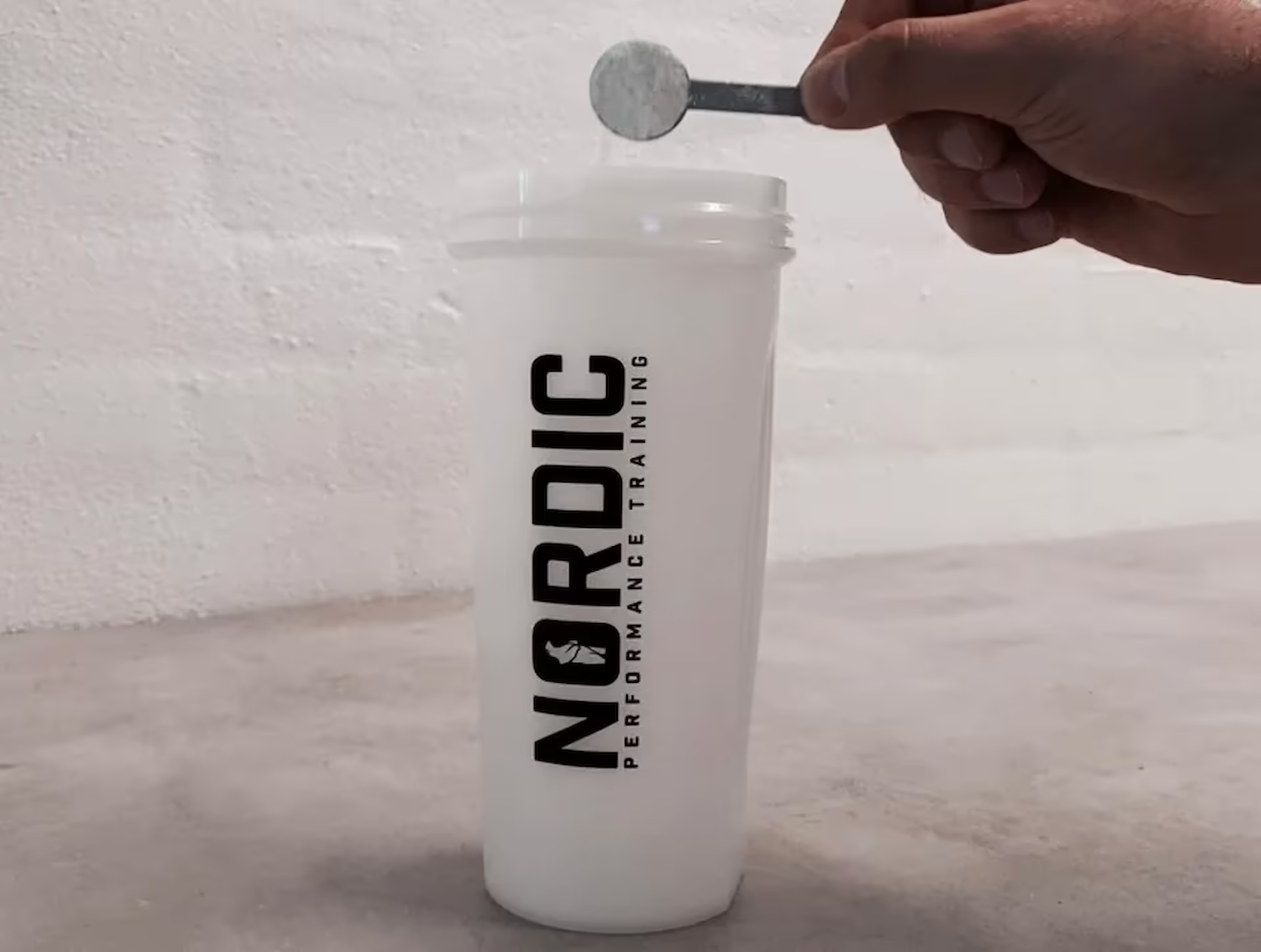
Based on feedback from hundreds of clients:
Ingredients:
- 30-40 g chocolate protein powder
- 5 g creatine monohydrate (approx. 1 tsp)
- 2 tsp instant coffee
- 200-300 ml milk
- Ice cubes
- Add possibly 1 tbsp sugar if it's been 2+ hours since last meal
Method:
- Mix all ingredients in a protein shaker
- Add ice
- Enjoy 30-45 minutes before training
Why it works:
- Caffeine: Acute focus and strength
- Creatine: Energy for muscles
- Protein: Amino acids for recovery
- Tastes fantastic and is cost-effective
Price per serving: Approximately 15-20 kr
Read more about pre-workout nutrition in our in-depth guide: Best Pre-Workout Meal Before Strength Training.
Your action plan – Start simple, build gradually
Step 1 – Everyone (start here): Buy vitamin D (25 micrograms). Take daily with dinner October-March.
Step 2 – Most Danes: Add omega-3 if you eat less than two fish meals per week.
Step 3 – Safety net: Add a multivitamin if you have irregular meals or less varied diet.
Step 4 – Strength trainers: Add creatine if you strength train two or more times per week and want to optimize your results.
Step 5 – With protein deficiency: Add protein powder only if you don't reach 1.6-2.2 g protein per kg body weight through food.
Want to know if you need protein powder? Read our guide: Protein Powder Guide – When You Need It.
Step 6 & 7 – Special needs:
- Magnesium with sleep or stress problems
- Carbohydrates for special training situations
Want quick, practical advice? Read: Top 5 Best Supplements for Health and Training.
The most important mistakes to avoid
Mistake #1: Starting with everything at once
The mistake: Many buy 8-10 different supplements the first day and take them all together.
The problem:
- Difficult to know what works
- Increased risk of side effects
- Poor compliance (too complicated)
The solution: Begin with vitamin D, evaluate after 4-6 weeks, and then add the next.
Mistake #2: Buying expensive "special formulas"
The mistake: Choosing exotic blends or "superfood combinations" at premium prices.
The problem:
- Basic versions work just as well
- Often unclear doses of active ingredients
- Waste of money
The solution: Choose simple, well-documented products from reliable brands. Bodylab, Myprotein, and Bulk work fantastically.
Mistake #3: Believing supplements can "fix" bad habits
The mistake: Ignoring basic sleep, diet, and training while taking 10+ supplements.
The problem:
- No supplement can replace the foundation
- Waste of time and money
- False expectations
The solution: Fix sleep (7-9 hours), diet (1.6-2.2 g protein/kg, 400-600 g fruit/vegetables), and training first. Then add relevant supplements.
Mistake #4: Falling for marketing promises
The mistake: Buying products with claims like "guaranteed results" or "lost 10 kg in 2 weeks."
The problem:
- If it sounds too good to be true, it probably is
- Often dangerous or illegal ingredients
The solution: Stick to products with realistic claims based on physiology.
Who really needs supplements?
We often get that question during a training course.
Recently, I talked with two new clients:
Client 1: A 39-year-old nurse who ate fish 2-3 times per week, many vegetables – but almost no meat. She didn't need a long list of products, but a single protein powder could be a practical solution to increase protein intake.
Client 2: A 33-year-old accountant who almost never ate fish and only got vegetables in limited amounts, but lots of meat. Here it made good sense to consider both omega-3 and a simple multivitamin as safety net.
Both also got creatine recommended if they wanted to optimize muscle mass and performance – because it's one of the most well-documented supplements for strength training.
Who typically needs supplements?
For clients with really varied and regular diet, we usually only recommend vitamin D in the winter half-year. But the truth is that most Danes don't eat quite as optimally as they themselves think.
Therefore, there are some groups where supplements often make sense:
- Pregnant and nursing: Increased need for e.g., folic acid and iron
- Vegans and vegetarians: Especially B12, but also iron, zinc, and omega-3 can be relevant
- Elderly over 65 years: Often need extra vitamin D, B12, and calcium
- People with low fish consumption: Can benefit from omega-3
- Strength trainers: Creatine + possibly protein powder
- Busy people: Multivitamin as safety net
The most important thing is to look at diet and lifestyle first, and then assess whether individual supplements can make sense as supplements.
Frequently asked questions about supplements
What does supplements mean?
Supplements are concentrated nutrients in powder, capsule, or pill form that are intended to supplement your normal diet – not replace it. They are regulated as foods and may only indicate physiological effects.
Is it necessary to take supplements?
No, supplements are not necessary for most people. However, they can be relevant if you want to optimize health or performance – especially vitamin D, omega-3, magnesium, protein powder, and creatine.
Which 5 supplements are the most important?
The 5 most useful supplements are:
- Vitamin D (all Danes October-March)
- Omega-3 (with <2 fish meals/week)
- Creatine (with strength training)
- Multivitamin (as safety net)
- Protein powder (if difficult to reach protein goal)
They cover common deficiencies, support performance, and are well-documented in research.
When should you take supplements?
Supplements should be taken when it fits best into your daily routine, so you remember them. Fat-soluble vitamins are best taken with meals, and caffeine approximately 45-60 minutes before the desired effect.
How long does it take before supplements work?
Some supplements work the same day (e.g., caffeine or magnesium for sleep), while others take weeks to months. Vitamin D and omega-3 show effect after 4-6 weeks, while creatine requires 3+ months for full effect.
Can you take too many supplements?
Yes, overdose can cause serious side effects. Too much vitamin D can damage kidneys, excess vitamin A can damage liver, iron can cause poisoning, and too high zinc intake can weaken immune system.
Should I take supplements if I eat healthy?
If you eat varied with protein, plenty of fruit and vegetables, fish twice a week, and get sunlight regularly, supplements are usually unnecessary. But most people don't meet these criteria consistently.
Are expensive supplements better?
Not necessarily – a higher price often reflects marketing. What matters is correct dosage, good absorption, and independent quality control. Reliable brands include Pharmacy, Matas, Bodylab, Myprotein, and Bulk.
Should I take supplements on empty stomach?
It depends on the type:
- Fat-soluble vitamins (A, D, E, K): Take with meal
- Omega-3: Take with meal (reduces "fish burps")
- B12: Best on empty stomach
- Iron: On empty stomach with vitamin C (but can cause nausea)
- Magnesium: With meal or in evening
Can supplements affect my medication?
Yes, supplements can interact with prescription medication. Especially omega-3 (blood thinning), St. John's wort (antidepressants), and magnesium (antibiotics) can cause problems. Always consult your doctor if you're on medication.
Conclusion: Supplements made simple
After 10+ years of practical experience with thousands of clients, our most important observation at Nordic Performance Training is: Simplicity gives better results than complexity.
What works in practice
Most clients benefit from:
- Multivitamin as daily safety net (possibly gender-specific)
- Vitamin D in winter (all Danes)
- Omega-3 if they eat under 2 fish meals weekly
Strength trainers add:
- Creatine 5 g daily (most documented sports supplement)
- Protein powder if difficult to reach 1.6-2.2 g protein per kg body weight
Everything else is probably unnecessary – unless you have specific medical needs.
5 most important tips about supplements
- Foundation first: Supplements cannot compensate for poor diet, lack of sleep, stress, or inactivity
- Quality over quantity: 2-3 well-documented products beat 12 random ones
- Evidence over marketing: If it sounds too good to be true, it probably is
- Professional consultation: Involve doctor with medication or chronic diseases
- Patience: Supplements work over weeks and months, not days
Most important insight about supplements
The industry wants you to believe that optimal health requires complex formulas and specialized products. But my experience shows the opposite.
Real health comes from:
- Varied, nutritious food
- Regular training
- Sufficient sleep and recovery (7-9 hours)
- Stress management
- Social relationships and quality of life
Supplements can be a useful supplement to this foundation – but never the main focus.
What works in practice?
Those who get best results:
- Focus on basics: training, diet, and sleep
- Take few, well-chosen supplements consistently
- Make gradual lifestyle changes
- Have realistic expectations for timeline
Those who become disappointed:
- Constantly switch between new "wonder products"
- Take 8+ different supplements daily
- Believe supplements can "fix" bad basic habits
- Fall for every marketing campaign and trend
Want professional help?
At Nordic Performance Training, we continue to help clients optimize their health through evidence-based approach to strength training and simple nutrition advice.
Book a free start-up conversation at Nordic Performance Training, and we'll help you navigate the supplement jungle and optimize your overall health.
References
DTU Fødevareinstituttet. (2016). Seks ud af ti danskere tager kosttilskud.
https://www.food.dtu.dk/nyheder/nyhed?id=d45f3442-2613-4295-810d-581626b51f63
Tetens, I., Andersen, L.F., & Rasmussen, L.B. (2014). Danskernes forbrug af kosttilskud. DTU Fødevareinstituttet.
https://orbit.dtu.dk/en/publications/danskernes-forbrug-af-kosttilskud
Sundhedsstyrelsen. (2024). D-vitamin og calcium – anbefalinger til befolkningen. https://www.sst.dk/da/Borger/En-sund-hverdag/Kost/D-vitamin-og-calcium
Fødevarestyrelsen. (2024). Kosttilskudsvejledning – Vejledning om kosttilskud og berigede fødevarer.
https://foedevarestyrelsen.dk/lovstof/vejledninger/kosttilskudsvejledning
Sundhed.dk. (2023). D-vitaminmangel. https://www.sundhed.dk/borger/patienthaandbogen/hormoner-og-stofskifte/sygdomme/oevrige-sygdomme/d-vitamin-mangel/
Forbrugerrådet Tænk. (2024). Kosttilskud – råd, test og viden om vitaminer og mineraler.https://taenk.dk/emne/kosttilskud
Autier, P., Mullie, P., Grimaldi-Bensouda, L., & Gandini, S. (2014). Vitamin D status and ill health: A systematic review. The Lancet Diabetes & Endocrinology, 12(2), 119–145. https://pubmed.ncbi.nlm.nih.gov/24622671/
Calder, P. C. (2010). Omega-3 fatty acids and inflammatory processes. Nutrients, 15(6), 1331. https://pubmed.ncbi.nlm.nih.gov/22254027/
Cohen, P. A. (2022). Hazardous dietary supplements. New England Journal of Medicine, 386(15), 1472–1480. https://pubmed.ncbi.nlm.nih.gov/24693886/
Helms, E. R., Zinn, C., Rowlands, D. S., & Brown, S. R. (2013). A systematic review of dietary protein during caloric restriction in resistance trained lean athletes: A case for higher intakes. International Journal of Sport Nutrition and Exercise Metabolism, 32(6), 421–436. https://pubmed.ncbi.nlm.nih.gov/24092765/
Kerksick, C. M., Wilborn, C. D., Roberts, M. D., et al. (2018). ISSN exercise & sports nutrition review update: Research & recommendations. Journal of the International Society of Sports Nutrition, 15(1), 38. https://pubmed.ncbi.nlm.nih.gov/30068354/
Kreider, R. B., Kalman, D. S., Antonio, J., et al. (2017). International Society of Sports Nutrition position stand: Safety and efficacy of creatine supplementation. Journal of the International Society of Sports Nutrition, 20(1), 2196367. https://pubmed.ncbi.nlm.nih.gov/28615996/
Rizzo, G., Laganà, A. S., Rapisarda, A. M. C., & Frigerio, G. (2016). Vitamin B12 among vegetarians: Status, assessment and supplementation. Nutrients, 14(5), 956.
https://pubmed.ncbi.nlm.nih.gov/27916823/
Schoenfeld, B. J., & Aragon, A. A. (2018). How much protein can the body use in a single meal for muscle-building? Implications for daily protein distribution. Journal of the International Society of Sports Nutrition, 15(1), 10. https://pubmed.ncbi.nlm.nih.gov/29497353/
Biesalski, H.K. & Tinz, J. (2017). Multivitamin/mineral supplements: Rationale and safety – A systematic review. Nutrition, 32(3), 339–347.https://pubmed.ncbi.nlm.nih.gov/27553772/
Zhang, Y., Xun, P., Wang, R., Mao, L., & He, K. (2016). Effects of magnesium supplementation on blood pressure: A meta-analysis of randomized controlled trials. Hypertension, 79(10), 2205–2214. https://pubmed.ncbi.nlm.nih.gov/27402922/
Related Blog Posts
.svg)
.svg)

.svg.webp)

